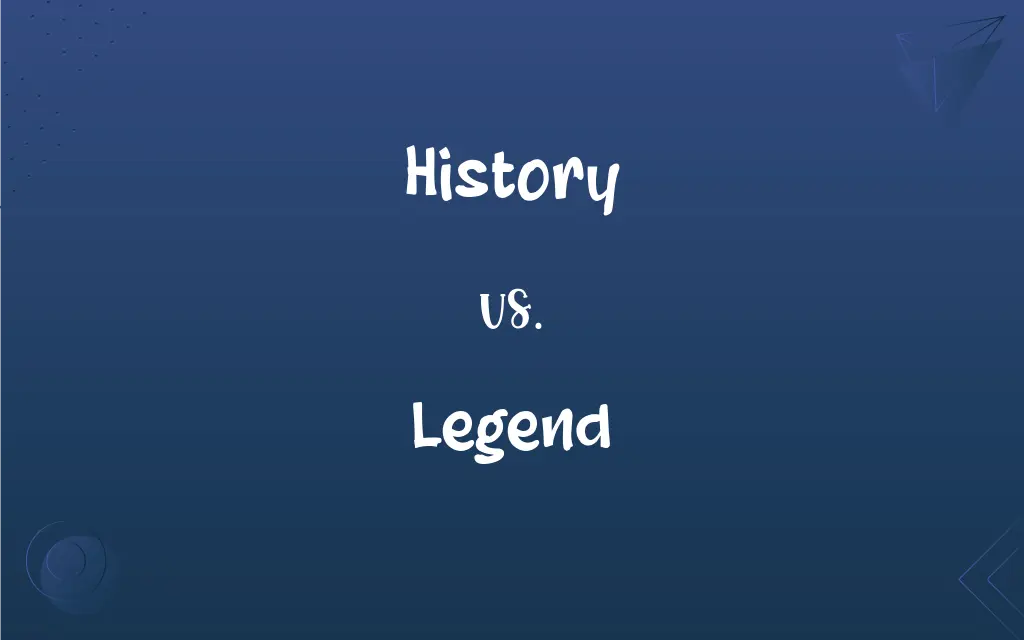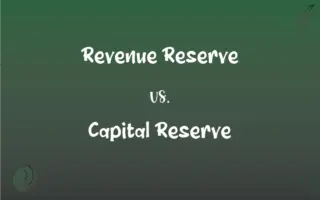History vs. Legend: What's the Difference?
Edited by Aimie Carlson || By Harlon Moss || Updated on October 20, 2023
History refers to factual accounts of past events; legend is a traditional story or narrative often believed to be historical but not verified.

Key Differences
History encompasses the documented, factual accounts of past events, often based on concrete evidence and research. In contrast, a legend is a traditional tale or narrative that has been passed down over generations, usually containing elements of truth mixed with mythological or fantastical components.
When we study history, we rely on primary sources, such as diaries, records, or photographs, to understand the chronology and context of past events. Legends, however, thrive on oral traditions, handed down through storytelling, with the potential for the tale to evolve and adapt over time.
Within history, the aim is to present an accurate and unbiased representation of events, ensuring a clear distinction between facts and opinions. Legends, being products of culture and imagination, do not necessarily adhere to factual accuracy but instead focus on conveying morals, values, or beliefs of a community.
It is important to recognize that while history attempts to remain objective and grounded in reality, legends can be influenced by the subjective interpretations and embellishments of those passing them on.
Comparison Chart
Nature
Factual and documented.
Traditional tales often with unverified accounts.
ADVERTISEMENT
Sources
Based on primary sources (e.g., records, diaries).
Thrives on oral traditions and storytelling.
Aim
To present an accurate account of past events.
To convey morals, values, or cultural beliefs.
Verification
Often verified through evidence and research.
Not necessarily verified; contains elements of myth.
Evolution
Static, based on documented facts.
Can evolve and adapt over time through retelling.
History and Legend Definitions
History
History is a chronological record of significant occurrences.
The timeline provided a comprehensive look at world history.
ADVERTISEMENT
Legend
Legends often incorporate mythical or fantastical elements.
According to legend, the phoenix rises from its ashes.
History
History is the study of past events and their impact on the present.
The history of ancient Rome has fascinated scholars for centuries.
Legend
Legends convey cultural values, morals, or beliefs.
The legend taught the importance of honor and sacrifice.
History
History is the sum of all past events, whether documented or not.
Oral traditions preserve a portion of history not found in books.
Legend
Legends are passed down orally, evolving with each retelling.
The legend of the haunted forest grew scarier with every generation.
History
History can refer to a specific period or series of events.
The history of the Renaissance was marked by artistic and intellectual revival.
Legend
A legend is a traditional story often believed to have historical basis but not proven.
The legend of King Arthur and the Knights of the Round Table has captivated audiences for generations.
History
History encompasses the discoveries, achievements, and failures of humanity.
The invention of the printing press marked a pivotal moment in history.
Legend
A legend can also refer to a person whose fame or notoriety makes them a source of exaggerated stories.
In the world of basketball, Michael Jordan is considered a legend.
History
A chronological record of events, as of the life or development of a people or institution, often including an explanation of or commentary on those events
A history of the Vikings.
Legend
An unverified story handed down from earlier times, especially one popularly believed to be historical.
FAQs
Can legends contain truths?
Yes, legends often have a basis in historical events but are embellished over time.
Are historical accounts always accurate?
While history aims for accuracy, interpretations and biases can affect historical accounts.
How does a legend differ from history?
A legend is a traditional tale, often believed to be historical, but not verified, and can contain mythical elements.
Are myths and legends the same?
Both are traditional stories, but myths often explain natural phenomena or deities, while legends focus on purported historical events or figures.
Can history influence the present?
Yes, understanding history can shape current perspectives, decisions, and societal structures.
How are legends passed down?
Legends are typically passed down orally through generations, often evolving in the process.
How can one verify historical facts?
Through rigorous research, cross-referencing sources, and evaluating evidence.
Why do people create legends?
Legends can honor heroes, explain the unexplained, or reinforce cultural values and beliefs.
How is history typically recorded?
History is recorded through documents, writings, artifacts, and other tangible evidence.
What is history?
History is the study and account of past events based on factual evidence and documentation.
What sources are used in historical research?
Primary sources like diaries, records, and photographs are essential in historical research.
Why are legends important to cultures?
Legends reflect and convey cultural values, morals, and beliefs, and contribute to a community's identity.
Are all legends ancient?
No, legends can form in any time period and may even be relatively recent.
What's the role of historians?
Historians analyze, interpret, and write about the past based on evidence and sources.
Can legends be written down?
Yes, many legends have been transcribed, but they often originate from oral traditions.
Do legends have a moral or lesson?
Many legends convey morals or lessons reflective of cultural values.
How do we know about ancient history?
Through archaeological findings, ancient writings, artifacts, and other preserved evidence.
Are historical movies always accurate?
Historical movies may take creative liberties for narrative purposes, so they may not always be entirely accurate.
Can a person be termed a legend?
Yes, a person of notable fame or notoriety can be referred to as a legend.
Is history static?
While facts remain, interpretations of history can change based on new evidence or perspectives.
About Author
Written by
Harlon MossHarlon is a seasoned quality moderator and accomplished content writer for Difference Wiki. An alumnus of the prestigious University of California, he earned his degree in Computer Science. Leveraging his academic background, Harlon brings a meticulous and informed perspective to his work, ensuring content accuracy and excellence.
Edited by
Aimie CarlsonAimie Carlson, holding a master's degree in English literature, is a fervent English language enthusiast. She lends her writing talents to Difference Wiki, a prominent website that specializes in comparisons, offering readers insightful analyses that both captivate and inform.































































